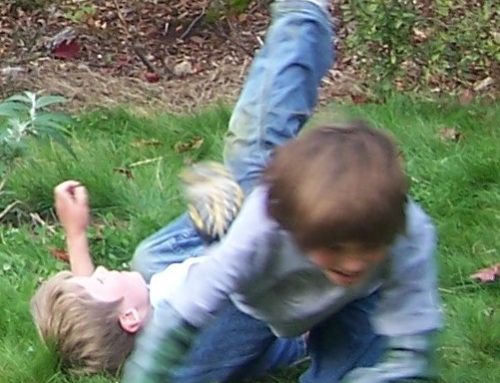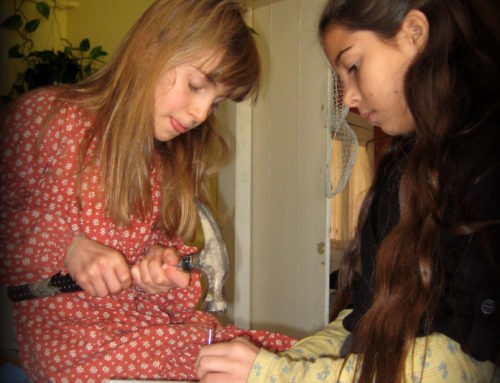A Context for Mutuality…
Adult/child relationships are also constructed through family design and structure. In mainstream society and nuclear family settings, virtually all relationships children have, at least initially, are mediated through their parents. While kids gain greater independence, especially as they get older, in conducting peer-to-peer relationships, there is little scope for independently initiated and facilitated relationships with adults. Most child-adult relationships are based on adult authority such as parents and teachers and not on mutually shared interests. In addition, adults who do not have some position of authority or an official role in kids’ lives, in mainstream society, often have little opportunity to interact with children. Jessica Kulynych, in writing about beliefs and ideology concerning children’s participation in democracy and public discourse, notes that children’s lives have become largely personal and family matters that keep children very private.
In more communal settings there is opportunity for adults and children to form relationships independent of parental mediation and based on mutual interest. For example:
Ben (25) and Sidney (4) are playing Legos. They are both very into the things they are building, Ben just as much as Sidney. It’s a relationship based on mutual interest and enjoyment. All the kids are quite fond of Ben and he has a natural ease with them. Even little Ana, who is just one and a half, is obsessed with Ben. “Ben, Ben, Ben” over and over till she gets his attention or gets him to do what she wants. Though he resists at times when he’s doing other things, she often wins him over and gets him to do her bidding. She adores him and gives him hugs and kisses and sometimes prefers him over dad and maybe even mom. (Dad went away for a couple of weeks and Ben helped out a lot where maybe dad would have, which allowed them time for greater connection.)
A couple of times Sidney has said, “Ben, I love you”. In this setting there is no obligation, and friendship can develop between adults and children based solely on mutual interest and friendship and not on adult authority.
I wonder if kids express such sentiments to (non-family) adults who they have in their lives in less chosen ways. Is this by virtue of the horizontal and freely chosen relationship between adults and children? Somehow the chosen nature of such a relationship takes away the question of authenticity… “does this person really care about me or is he just nice because it is his job”… Not being in a relationship of obligation but in one that is freely chosen by both people eliminates such question.
In communal settings, adults who might not choose to interact with or have much exposure to children, have the opportunity to be around kids and learn from them. Ben, before living in community, had no particular connection or relationship to children but in community has had the opportunity for all sorts of engagement and interaction. I think a lot of adults feel uncomfortable around kids- perhaps for lack of contact- and being in shared environments with kids helps decrease this alienation and discomfort. I have witnessed, throughout my life, the interactions between children and adults in community and seen people at first awkward around kids become more at ease and in some cases develop close friendships.
Separateness and lack of real experience help maintain prejudice, while contact and interactions with real people dispel preconceived notions about people different than ourselves and reveal the humanness in all of us. Adult society needs to have greater inclusion and exposure to kids in a free, rather than controlling, way and to learn to relate to children a little more on their terms. So often children in public (without obvious adult supervision) are considered up to no good, getting into trouble. Again Jesssica Kulynych (2001) makes the astute observation that there is little scope for children being in public and it being constructive.
Summary
In summary, We often engage with kids with the intention to improve upon them and contribute to their “development” in a way that devalues and discredits the people that they currently are. The contexts our culture provides for relationships between adults and children are often of adults having authority over children, making it difficult to form horizontal and mutually enriching relationships. In addition adults and children’s lives are kept very separate so that adults who do not hold some official role in kids’ lives often have very little contact with them.
More communal contexts provide opportunities for adults and children to engage in freely chosen and mutually enriching relationships without any greater obligation. needs, and do not use power or force to meet one person’s needs at the expense of another.
What are some of your experiences? Do you have relationships with younger people and children that you have both freely chosen? If you have kids, do they have adult friends? If you don’t have a family of your own or work with kids, do you have kids in your life? In what contexts?


Children are oftened boxed in by not being allowed to have responsibility in their own homes. They need nurturing by an adult who is able to give responsibility. At the moment I am teaching a 6 year old girl photography and sailing. The parents are astounded that their child knows more than them in both these fields. Both the ability in photography and sailing is astounding. It is bound up in mutual interest and trust and never forced. Her interest in both these activities was requested by the little girl heself! Strange how the parents still want to tell her what to do during these activities, although their knowledge is zero in these areas. These friendships should be based on mutual trust and responsibility. The result – a child with confidence, willing to take on new and interesting challenges, and the ability to grow into young responsible adults!